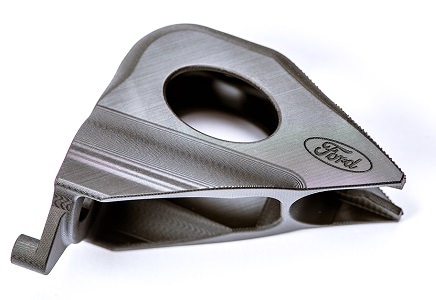Carbon® has recently developed the first digitally manufactured polymer parts in production for Ford Motor Company.

The parts include:
- Ford Focus HVAC (Heating, Ventilation and Cooling) Lever Arm Service Parts,
- Ford F-150 Raptor Auxiliary Plugs for a niche market, and
- Ford Mustang GT500 Electric Parking Brake Brackets
The companies jointly presented the applications at the Additive Manufacturing for Automotive Workshop at the 2019 North American International Auto Show (NAIAS) in Detroit.
Robust Combination of Technology and Material
Carbon and Ford have expanded their collaboration to design and produce several new digitally manufactured, end-use parts using:
- Carbon’s robust and reliable printers,
- Proprietary Digital Light Synthesis™ technology, and
- Innovative EPX (epoxy) 82 material
Carbon’s durable EPX 82 material proved ideal for these parts, passing Ford’s rigorous performance standards and withstanding critical requirements such as:
- Interior weathering;
- Short- and long-term heat exposures;
- UV stability;
- Fluid and chemical resistance;
- Flammability (ISO 3795); and
- Fogging (SAEJ1756) for the selected applications
Carbon Digital Light Synthesis™ Technology
Leveraging the Power of Digital Manufacturing
“We are thrilled to be collaborating with Ford Motor Company and are excited about the many opportunities to leverage the power of digital manufacturing to deliver durable, end-use parts with similar – or better – properties as injection molded parts,” said Dr. Joseph DeSimone, CEO and Co-founder of Carbon. “The automotive industry shows significant promise for using digital fabrication at scale, and our work with Ford is a perfect example of the kind of innovation you can achieve when you design on the means of production.”
Through partnerships with companies that also include adidas, Johnson & Johnson, and Vitamix, Carbon is moving beyond 3D printing to full-scale digital manufacturing by helping customers create break-through products across industry sectors, from automotive to healthcare to consumer goods. In November 2018, Carbon announced radical price reductions for its most widely used resins, further expanding the addressable market for large-scale digitally manufactured parts.